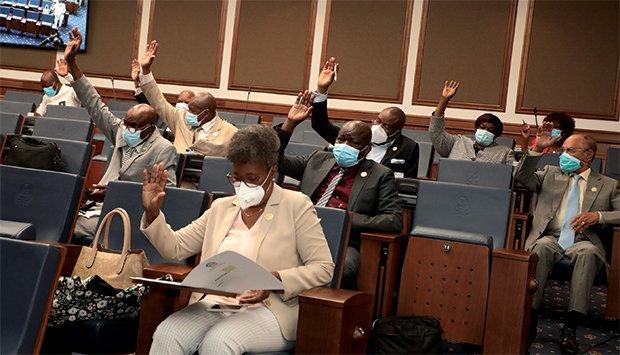Africa-Press – Angola. Yesterday, the National Assembly unanimously approved more than 16 articles of the Draft Law amending the new Angolan Criminal Procedure Code.
Deputies and members of the technical team of the Commission for the Reform of Justice discussed, among others, the definition of the powers of the guarantee judge and its sphere of intervention, the situation of continuation of trials for citizens who evade justice, the harmonization of , clarification of the spaces for intervention between the Public Ministry and the criminal police bodies.
To make the discussion process more fruitful, the deputies adopted the methodology of approving the revision of the code by titles and chapters. During the discussions on Articles 1 and 2 of the aforementioned Bill, one of the members of the Technical Commission for the Reform of Justice, in the presence of the Secretary of State for Justice, Orlando Fernandes, explained that the amendment made to the aforementioned articles is in the sense of the first interrogation of individuals at liberty be carried out by the Public Ministry, and not by criminal police bodies.
The Public Prosecutor’s Office, he pointed out, is in a better position, in the first interrogation, to guarantee the exercise of the right of defence, with subsequent investigations being the responsibility of the criminal police bodies.
The independent deputy David Mendes defended, in this regard, that, during the first interrogation, legal guarantees should be established in the presence of the representatives of the defendants, as a way of preventing police investigations from continuing to be carried out under threats, beatings and fake promisses.
António Paulo, from the MPLA bench, referred to the existence of recent diplomas that establish a distinction between the powers of the Police bodies for petty crimes and the Criminal Investigation Service.
He questioned how this distinction can be reconciled, knowing that leaving the procedural or criminal investigation only to the Criminal Investigation Service posed serious problems or questions regarding the operationalization of the Police’s action.
The parliamentarian spoke of the “lag” existing between the capillarity of the Police services, compared to the Criminal Investigation services, which mean that there is no representation of the Criminal Investigation Services in all places where there are police stations.
Speaking to the press, as a technician for the Justice Reform Commission, Mota Liz considered the discussions with the deputies “peaceful”, stressing that they serve to make the new Criminal Procedure Code more efficient and in line with the policy challenges criminal.
“This is a punctual optimization reform, and not a profound change to the Code”, pointed out Mota Liz, admitting that more problems will continue to arise in the Code as it is applied by justice operators. In this regard, she pointed out the need to combat violent, economic crimes and crimes against State property, and defended greater efficiency in the investigation, prosecution and trial processes, especially economic crimes.
Regarding the guarantee judges, Mota Liz said it is necessary to interpret how far their competence goes, especially if there are only guarantees in the preparatory instruction, or their competence extends to the contradictory instruction.
For Mota Liz, the judicial magistrate who intervenes in the investigation phase, whether preparatory or contradictory, is prevented, by virtue of the Code, from interceding in the subsequent phases (trials).
Discussions, in particular, of the Draft Law amending the Criminal Procedure Code continue today, with questions regarding the Administrative Litigation Code.
For More News And Analysis About Angola Follow Africa-Press






